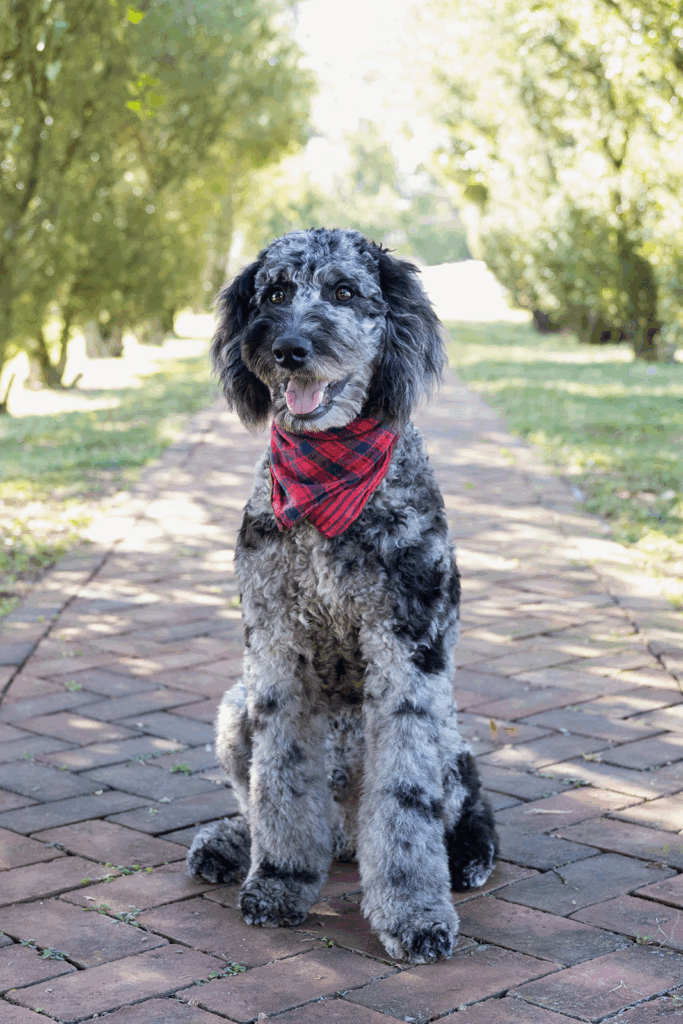If you’ve spent time in Poodle or Golden Retriever communities online, you may have noticed debates about Merle coloring. Some claim Merle is “unnatural” in these breeds, while others celebrate the stunning patterns it can create.
This post will explain the Merle gene, how it works, and why it sometimes appears in breeds like Poodles and Golden Retrievers. We’ll also address common myths and provide tips for those considering adopting a puppy.
What Is the Merle Gene?

The Merle gene is a genetic variation that affects the pigmentation of a dog’s coat, often producing a striking, patchy pattern. It can also influence eye colour, skin, and, in some cases, overall health when inherited in certain ways.
As Joy Holliday of Much Ado About Doodles (MAAD) explains, “The Merle gene is actually a genetic mutation that affects the colouring of the coat and eyes, often giving the coat a dappled or mottled look — and it can even lead to two different eye colours.”
Merle is a dominant gene, meaning a dog only needs one copy for the pattern to appear. However, when two Merle dogs are bred together, the pairing increases the risk of producing a “double Merle,” which can be linked to serious health issues such as vision or hearing loss.
Merle in Poodles and Golden Retrievers

Traditionally, Merle was not associated with Poodles or Golden Retrievers, which has fueled the belief that it’s “unnatural.” However, advances in genetic testing and responsible breeding practices show that Merle can — and does — appear in these breeds.
“The biggest issue I’ve seen is that people do not believe poodles carry for Merle naturally, and there’s information out there supporting both sides,” explains Joy. “I personally believe that since a dog can be Merle and it does not manifest, how can anyone be so sure poodles have never carried it? Whether or not another breed was introduced way back doesn’t change the fact that genetic testing is 99% accurate, and my Merle parents only show poodle and retriever.”
With careful, responsible breeding, Merle patterns can be expressed safely, while avoiding the health risks linked to double Merle dogs.
Genetics and Inheritance of Merle

The Merle gene can be complex, with its expression influenced by factors such as gene length and interactions with other coat colour genes. But one thing is clear: breeding two Merle dogs together carries significant risks.
“If you breed two Merle dogs together, you present a risk of albinism, blindness, and deafness,” shares Joy. “Here at MAAD, we test carefully and thoroughly and never even have two Merles of opposite sex near each other.”
Debunking Common Merle Myths

Myth 1: Merle is unnatural in Poodles or Golden Retrievers.
Fact: Merle can appear naturally in these breeds through genetic variation and selective breeding.
Myth 2: Merle is always unsafe.
Fact: Only double Merle pairings carry higher health risks; single Merle dogs are safe when responsibly bred.
Myth 3: Merle only affects coat color.
Fact: Merle can also influence eye and skin pigmentation, making genetic understanding important.
3 Ways to Identify a Healthy Merle Dog

When considering a Merle puppy, it’s important to do your homework:
- Ask breeders for health testing and genetic screening.
- Request pedigrees and documentation showing Merle inheritance.
- Understand that Merle may not be breed-standard, but it can be a healthy and beautiful variation when handled responsibly.
“Honestly, the biggest piece of advice I can give is to be ready for a lot of folks to comment on your Merle puppy,” Joy shares. “Merle is a lot of fun because every puppy that is Merle is different, so you don’t have to worry about your puppy looking identical to another puppy in the neighborhood! The care is absolutely identical to any other puppy that you would get from us — grooming, regular wellness checks, etc.”
The Importance of Choosing the Right Breeder
Because the Merle gene carries both beauty and complexity, working with a responsible breeder is key. Careful planning and genetic testing help protect against the risks of double Merle, ensuring puppies grow up healthy and thriving.
At Much Ado About Doodles, we prioritize these safeguards in every decision we make. Our breeding program focuses on health, temperament, and transparency, so families can feel confident when welcoming a Merle puppy into their home.
For anyone curious about Merle, meeting puppies in person is often the best way to appreciate the variety, individuality, and joy they bring. Each one is unique, and with the right start, they can be just as healthy and loving as any other dog.
